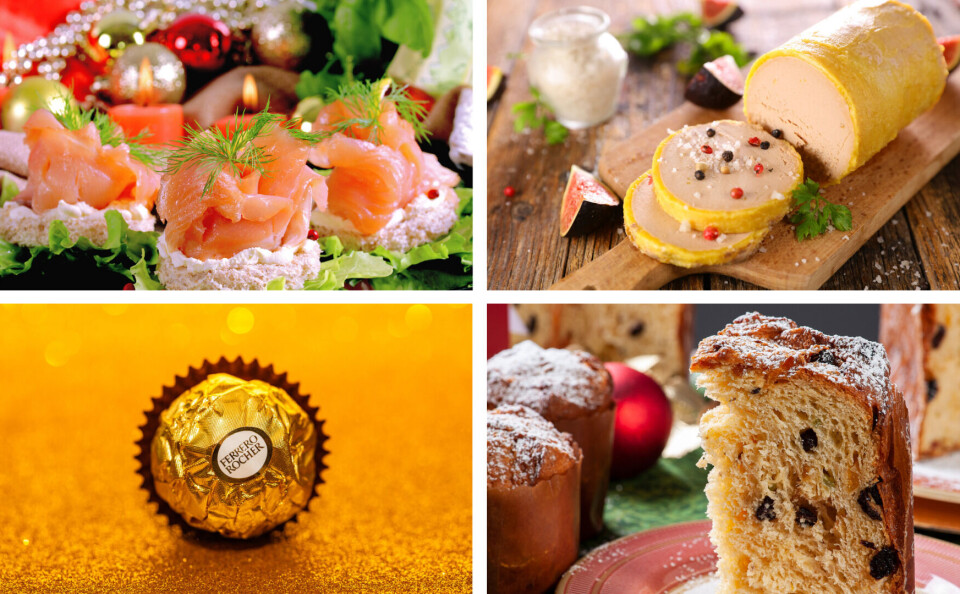-
White storks make strong return in France via nest ‘platforms’ and clipped wings
The Ligue pour la Protection des Oiseaux shares the conservation challenges in saving these birds from extinction
-
Hosting scheme in south-west France lets newcomers sample lifestyle
Households in nine Dordogne communes volunteer under Mes Nouveaux Voisins scheme
-
French boulangeries demand right for staff to work on May 1 so they can open
Artisan bakery owners can work but employees cannot, while certain industrial bakeries are allowed to remain open with workers
Salmon, panettone: beware these 7 Christmas food ‘scams’ in France
The public is advised to be alert to misleading packaging - and to vote for the worst fraud on this year’s shortlist

Salmon, pain d'épices, and panettone are some of the most-popular Christmas foods, but they have also been found to be at the centre of some deceptive scams in France.
The NGO Foodwatch - a consumer food association - has published its sixth annual warning against major food scams, which occur at this time of year as people struggle with mounting costs and seek to buy luxury items without the high price tag.
Foie gras, capon (a type of small chicken traditionally eaten at Christmas), and chocolate logs are also among the food types often subject to scams, or severely misleading labels.
In its annual ‘Casserole d’Or’ report, the NGO is inviting the public to vote for what they believe is the worst scam of the shortlist. People can choose what they believe to be the worst scam, and enter an email address to confirm.
The ‘winner’ will be announced after the vote closes at 23:00 on December 20.
Competing for the vote are:
1. Salmon shrinkflation
First on the list is smoked salmon from Labeyrie - under the name Le Boisé dégustation d'Ecosse, which has fallen victim to ‘shrinkflation’, the NGO said. This is when manufacturers reduce the amount of food in each pack, but keep the price the same (or even increase it).
Between December 2022 and December 2023, the six-slice version of this product fell from 220g to 210g at Monoprix, said Foodwatch. This equates to 4% less salmon, but the price rose 19% per kilo over the same time. The manufacturers did not make this change clear on the packaging.
When contacted by Le Parisien, Labeyrie said that the ‘soaring price of salmon’ explained the practice.
2. Pain d’épices...without honey
Next up is the ‘special foie gras’ pain d’épices (gingerbread cake/bread) from the brand Brossard. This product was firstly highly criticised for its high proportion of glucose-fructose syrup (the first item on the ingredients list), and for its lack of traditional honey.
The product was priced at the same level as the classic ‘Touche de miel’ brand gingerbread, even though the latter contains 8% honey.
In its defence, Brossard said that “distributors are free to set their own prices”.
3. Scallop terrine... without scallops
Also in the crossfire is the Breton-style scallop terrine (coquilles Saint Jacques) from Guyader, which does not actually contain scallop. In fact, the first ingredient on its list is hake.
The label also states that the ‘scallops’ are actually a similar-but-different kind of shellfish - clams, and cockles - which are “cheaper shellfish from the same family bought in bulk".
Guyader said that its practice was above-board, as “the use of fish as the first ingredient in a scallop terrine is authorised”.
4. Cooking lemon juice
Another misleading label under attack; the Bjorg cooking lemon has been identified as containing just 30% lemon juice, and 70% water.
The packaging plays up the ‘organic’ origins, and sells the product for €8 per litre (€1.54 per bottle), despite its watery composition.
5. Panettone with palm oil
Sweet products have not escaped judgement; Foodwatch has also issued a warning about panettone, the traditional Italian festive brioche.
Panettone from Maison Ciro, sold at Auchan, is in fact made with palm oil - a much cheaper and highly-controversial ingredient - instead of the real butter and ‘Italian know-how’ that the packaging suggests.
6. ‘Empty’ chocolates
The NGO also highlighted Ferrero Rocher's 126g 'Petits plaisirs' dark chocolate egg packets, which are 52% empty, and mainly just packaging. “With this product, Ferrero is really trying to sell you a load of ‘hot’ air,” said Foodwatch.
In its defence, Ferrero said that its packaging “contains a mixture of air and nitrogen to ensure that the pralines can be preserved”.
Foie gras ‘fraud’
The NGO has also singled out the ‘L'Emblématique' block of duck foie gras with Sauternes by Jean Larnaudie - although this has not made the shortlist for the public vote.
Despite the ‘emblematic’ title, the foie gras contains a considerable amount of sodium nitrite (E250), even though "nitrites are gradually disappearing from foie gras shelves", Foodwatch said.
It added that these additives “may contribute to the formation of probable carcinogenic compounds and encourage the development of colorectal cancer (the second most deadly cancer after lung cancer) and stomach cancer”.
How can I avoid being taken in by these and similar products?
In its free shopping guide, Foodwatch recommends that shoppers:
-
Read the list of ingredients carefully
-
Do not rush to buy the products on the displays set up for the festive season
-
Check the price per kilo and compare it with similar products
Related articles
'Buy French' labelling may hide food scams
Petition against ‘half empty’ food packaging sold in France
Bird mess, fake restaurants: Six scams to watch out for in France
























